As books of bible flash cards take center stage, this opening passage beckons readers into a world crafted with good knowledge, ensuring a reading experience that is both absorbing and distinctly original.
With the aid of flash cards, delve into the depths of biblical knowledge, unlocking the secrets of each book and gaining a profound understanding of the Word of God.
Overview of Books of the Bible Flash Cards
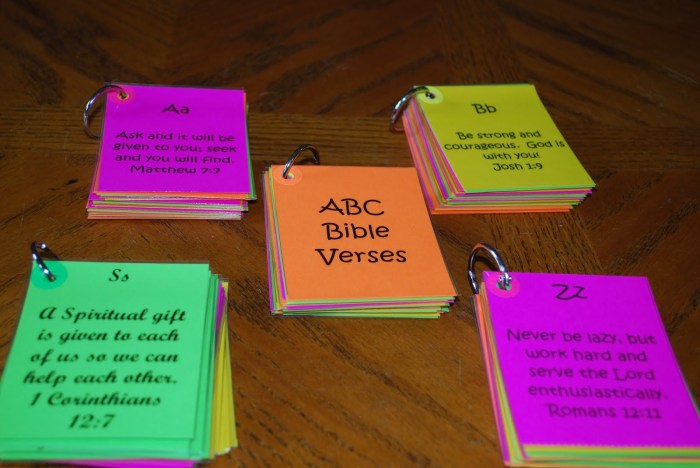
Studying the Bible can be a daunting task, but flash cards can make it easier. Flash cards are a simple and effective way to memorize information, and they can be used to study anything from the names of the books of the Bible to the key events in each book.
There are many different types of flash cards available, including physical cards, digital apps, and online resources. Physical cards are the most traditional type of flash card, and they can be made from paper, cardboard, or even index cards. Digital apps are a more modern option, and they offer a number of features that physical cards do not, such as the ability to track your progress and to create custom decks.
Online resources are another great option, and they offer a wide variety of flash cards on different topics.
Benefits of Using Flash Cards
There are many benefits to using flash cards to study the books of the Bible. Flash cards can help you to:
- Memorize the names of the books of the Bible.
- Learn the order of the books of the Bible.
- Understand the key events in each book of the Bible.
- Identify the main characters in each book of the Bible.
- See the big picture of the Bible’s story.
Key Features of Effective Flash Cards
Effective flash cards are essential tools for studying and memorizing information. They should be designed with clear and concise text, visually appealing elements, and durable construction to maximize their effectiveness.
If you’re looking for a fun way to learn about the Bible, check out books of Bible flash cards. They’re a great way to memorize key verses and learn new words, like those with the suffix “fy.” For example, the word “purify” means to make something clean.
You can find more words like this at words with the suffix fy . So grab a deck of Bible flash cards and start learning today!
To create or select effective flash cards, consider the following key features:
Clarity and Conciseness
- Use clear and concise language that is easy to understand.
- Focus on one key concept or piece of information per card.
- Avoid cluttering cards with unnecessary details or distractions.
Visual Appeal
- Incorporate visually appealing elements such as colors, images, or diagrams to make the cards more engaging.
- Use different fonts and font sizes to highlight important information.
- Consider using different colors for different categories or topics.
Durability
- Use high-quality materials such as laminated paper or plastic to ensure the cards can withstand repeated use.
- Consider using a ring binder or box to keep the cards organized and protected.
- Avoid using flimsy materials that can easily tear or bend.
Organization and Structure
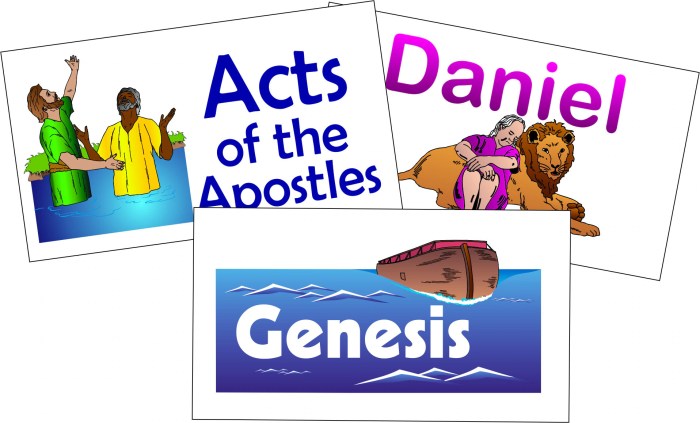
Organizing flash cards logically and systematically is crucial for efficient studying. It helps you categorize and sequence the information, making it easier to retrieve and retain.
Consider categorizing cards based on topics, themes, or chronology. For example, if studying history, you could group cards by historical periods or events. Sequencing cards in a logical order, such as chronological or cause-and-effect, aids in understanding the flow of information.
Categorization
- Topic-based: Group cards by specific subjects, such as grammar, vocabulary, or historical events.
- Theme-based: Categorize cards around central themes or concepts, such as character traits, literary devices, or scientific principles.
- Chronological: Arrange cards in chronological order, especially useful for historical or biographical topics.
Sequencing, Books of bible flash cards
- Chronological: Sequence cards in the order of events or time periods, allowing you to follow the progression of information.
- Cause-and-effect: Arrange cards to show the relationship between causes and their effects, aiding in understanding the interconnectedness of events.
- Problem-solution: Sequence cards to present a problem followed by its solution, fostering critical thinking and problem-solving skills.
Methods of Using Flash Cards
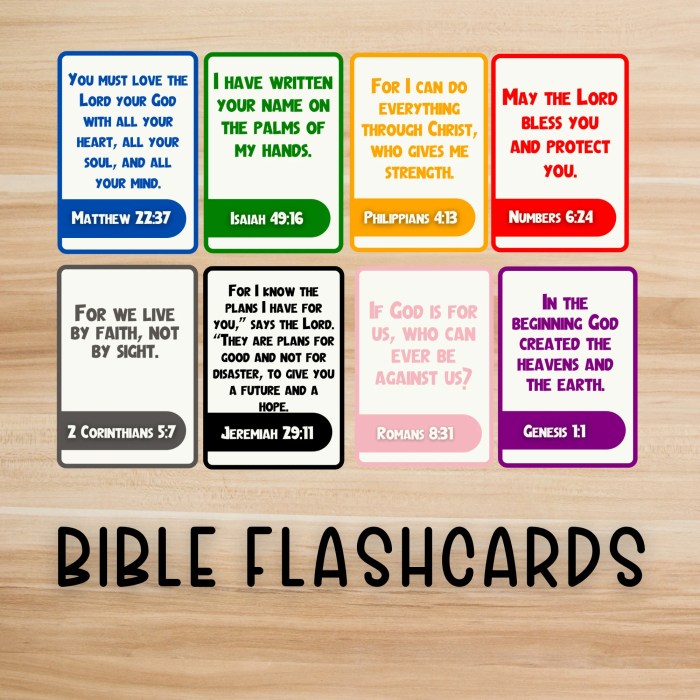
Flash cards are a versatile tool that can be used in various ways to enhance learning and retention. Different methods offer unique advantages and cater to different learning styles.
Active Recall
Active recall involves actively retrieving information from memory without looking at the answer. By repeatedly testing yourself on the flashcards, you force your brain to work harder and strengthen the neural connections associated with the information.
- Benefits:Improves long-term retention, promotes deeper understanding, and reduces the likelihood of forgetting.
- Limitations:Can be more time-consuming than other methods, especially for large amounts of information.
Spaced Repetition
Spaced repetition involves reviewing flashcards at increasing intervals. This method helps space out learning sessions, allowing your brain to gradually strengthen the memory trace. By revisiting the information at gradually increasing intervals, you prevent forgetting and reinforce the material.
- Benefits:Optimizes memory retention over time, reduces the frequency of reviews, and improves long-term recall.
- Limitations:Requires consistency in reviewing flashcards, which can be challenging to maintain.
Self-Testing
Self-testing involves using flashcards as a form of quizzing yourself. By covering up the answer and trying to recall the information on your own, you can assess your understanding and identify areas where you need further study.
- Benefits:Provides immediate feedback on your progress, helps identify weaknesses, and promotes self-awareness.
- Limitations:Can be discouraging if you encounter many incorrect answers, requires honesty in self-assessment.
Creating Flash Cards for Different Purposes: Books Of Bible Flash Cards
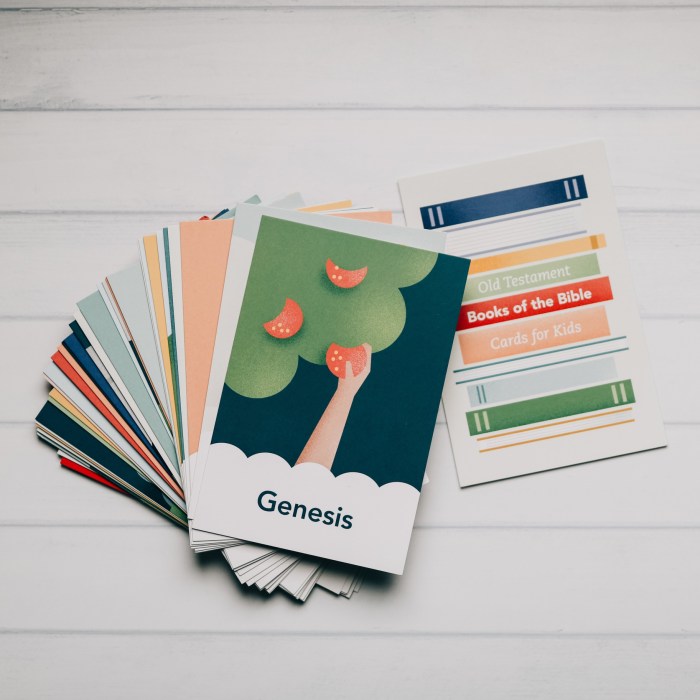
The versatility of flash cards extends beyond memorization. They can be tailored to meet specific study goals, enhancing comprehension and retention.
To design effective flash cards, consider the intended learning outcome. For memorizing book names, use one side for the book name and the other for its order in the Bible. For understanding key concepts, write a concept on one side and a concise explanation on the other.
Reviewing Historical Events
- Front: Event name
- Back: Date, key figures, significance
Evaluation and Assessment
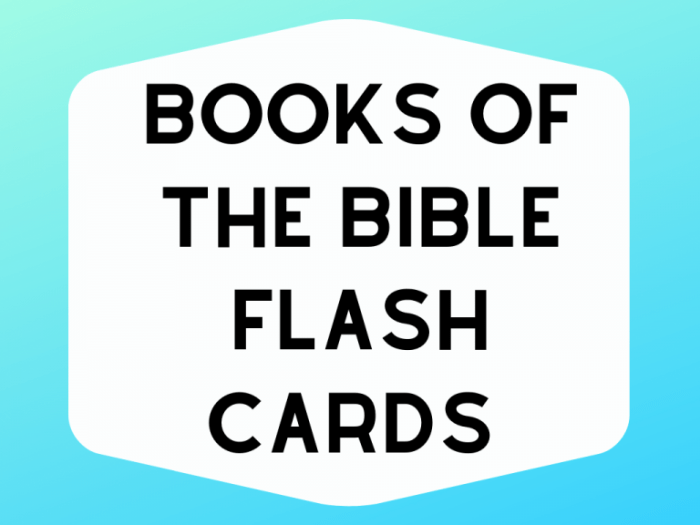
Regularly evaluating the effectiveness of flash cards is crucial to ensure they remain valuable study tools.
Tracking progress helps identify areas for improvement. One method is to keep a record of the number of cards answered correctly and incorrectly. This data can reveal patterns and indicate which concepts require additional attention.
- Conduct periodic quizzes or self-tests to assess understanding.
- Use different colors or markings on cards to track difficulty levels and progress over time.
- Seek feedback from peers or teachers to identify areas where cards can be improved or revised.
Detailed FAQs
What are the benefits of using flash cards to study the Bible?
Flash cards offer numerous benefits, including improved memory retention, active recall, spaced repetition, and personalized learning.
How do I create effective flash cards?
Effective flash cards should feature clear and concise text, visually appealing design, and durable construction. Use s, phrases, or questions on one side and the corresponding answers or information on the other.
How can I use flash cards for different study purposes?
Tailor flash cards to your specific goals, such as memorizing book names, understanding key concepts, reviewing historical events, or exploring specific themes.